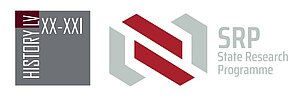NAVIGATING THE LATVIAN HISTORY OF THE 20TH–21ST CENTURY: SOCIAL MORPHOGENESIS, LEGACY AND CHALLENGES

Project No: VPP-IZM-Vesture-2023/1-0003
Implementation period: 15 December 2023 – 14 December 2026
Project funding: EUR 1 674 000
Project funding authority: Latvian Council of Science
Project leader: Dr. hist. Uldis Neiburgs
Project administrative leader: Dr. philol. Ieva Garda-Rozenberga
Project partners: University of Latvia's Institute of Literature, Folklore, and Art, Daugavpils University and Liepaja University
The project's overarching goal is to reduce the fragmentation of the Latvian history research field, endorse its international prominence, establish new benchmarks in public discourse for interpreting the Latvian history of the 20th century, stimulate new conceptual ideas about the development of Latvian statehood, and train new history researchers. To reach this multidirectional goal, the project proposes a broad research and communication program and defines four interrelated objectives: critically rereading the Latvian historiography of the 20th century in line with the perspective of social morphogenesis; reinterpreting Latvia’s master narrative of the 20th century in light of microhistory and mnemohistory; remediating Latvia’s history by focusing on the opportunities provided by digital humanities; rejuvenating the interdisciplinary research of Latvian history by providing opportunities for young and emerging scholars. The project results will include seven peer-reviewed monographs, at least 30 peer-reviewed research articles accepted for publishing, and recommendations on how to enhance history education, improve the use of digital resources in Latvian history research, as well as how to use historical knowledge in reducing the risks of disinformation and strengthening Latvia’s international image. The project also envisages diverse community outreach through expertise sharing, publications for the general public, and a citizen science campaign.
The project is organized into research, education, and impact-related work packages:
- Morphogenetic processes of Latvian nation-state during the 1920s and 1930s (lead by Dr. hist. Ēriks Jēkabsons);
- Morphogenetic cycles during the Second World War and Soviet-Nazi-Soviet occupation of Latvia on the 1940s and 1950s (Dr. hist. Kaspars Zellis);
- Structure of state and society in the late Soviet period (1960s–1980s) and the collapse of the Soviet occupation regime in Latvia (Dr. hist. Daina Bleiere, Dr. hist Irēna Saleniece);
- Social and economic transformation caused by the restoration of Latvia's national sovereignty and their impact on nowadays (Dr. sc. comm. Mārtiņš Kaprāns);
- Representations of Latvia's 20th-century history in the modern cultural space (Dr. philol. Zanda Gūtmane);
- Elevating Historical Research: Harnessing Digital Resources for Latvian Context (Dr. philol. Sanita Reinsone);
- History Training and Education (Ph. D. Ginta Ieva Bikše);
- Science Communication and Impact (Dr. hist. Ilze Boldāne-Zeļenkova).
In total, the project involves more than 30 researchers and students from the Institute of Latvian History, the Faculty of History and Philosophy, the Institute of Philosophy and Sociology, the Faculty of Social Sciences, the Institute of Literature, Folklore, and Art of the University of Latvia, the National Defense Academy of Latvia, Daugavpils University, Liepaja University, and other institutions. In addition, the historians of the Latvian War Museum and the Museum of the Occupation of Latvia, as well as CLARIN-LV and DARIAH-EU experts in digital humanities, will also be involved in the project.
© Project's image design by Ģirts Boronovskis
© Photos by A. Grūbers and G. Dieziņš
2024. gada 8. maijā, Nacisma sagrāves un Otrā pasaules kara upuru piemiņas dienā, plkst. 9.00. Brīvības laukumā, Rīgā tika atklāta ceļojošā izstāde “1944 – kara lauzums Latvijas pilsētainavā”. Izstādes autori ir vēsturnieki – Latvijas Nacionālās aizsardzības akadēmijas pētnieks Valdis Kuzmins, Latvijas Universitātes Latvijas vēstures institūta vadošais pētnieks, Dr. hist. Uldis Neiburgs un Latvijas Kara muzeja vēsturnieks Jānis Tomaševskis. Grafisko dizainu veidojusi scenogrāfe Ineta Sipunova, izstādes projekta koordinatore ir muzeoloģe, domnīcas Creative Museum vadītāja Ineta Zelča Sīmansone.
2024. gadā izstādi var aplūkot:
Rīga: 8.05.–17.05. (Brīvības laukums);
Rēzekne: 18.05.–9.06. (pilskalna teritorija Dārzu ielā);
Gulbene: 10.06.–30.06. (pilsētas centrs);
Salaspils: 1.07.–21.07. (Salaspils memoriāls);
Jelgava: 22.07.–18.08. (Hercoga Jēkaba laukums);
Bauska: 19.08.–15.09. (Rātslaukums);
Valmiera: 16.09.–6.10. (pilsētas centrs).
Rīgā: 7.10.–27.10. (Latviešu strēlnieku laukums).
- Navigating the Latvian History of the 20th–21st Century
- Expanding Concept and Methodology for Human Past Studies
- Ethnographer, Society, and Art
- The environment and early farming
- Viking Age in Latvia: an interdisciplinary study
- Burial practices in the landscape
- Skills in synergy, crafts in context
- Dyes and Dyeing
- Magic and Superstition
- Knots in Clay
- Contextualization of Traditional Clothing

 CONFERENCE
CONFERENCE